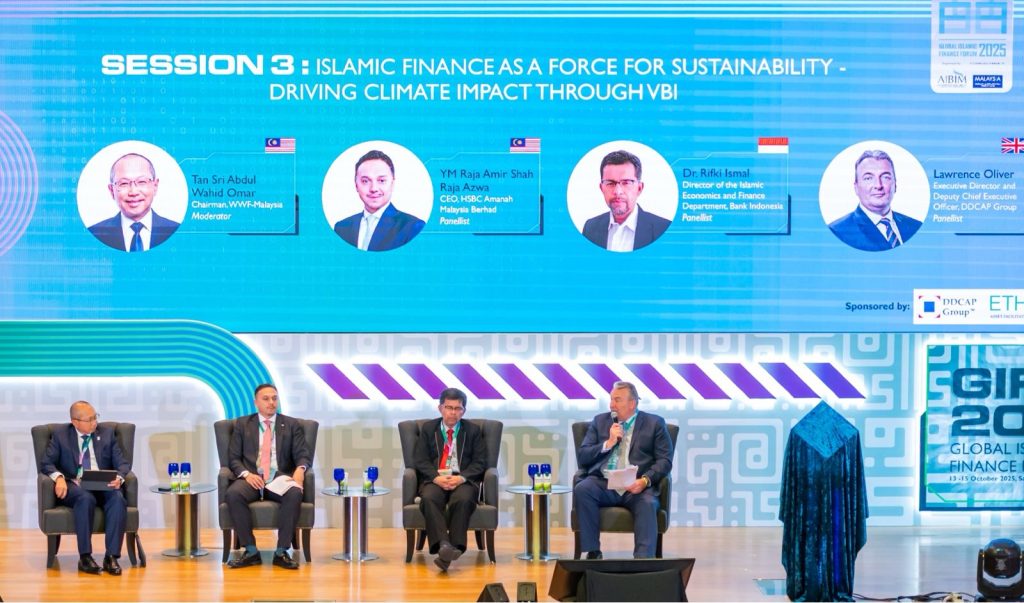
Kuala Lumpur, Malaysia (13 October 2025): The Global Islamic Finance Forum (GIFF) 2025 session on “Islamic Finance as a Force for Sustainability – Driving Climate Impact through Value-Based Intermediation (VBI)” examined how Islamic finance is evolving from compliance to measurable impact, positioning itself as a key driver for climate action, social inclusion and sustainable economic growth.
Moderated by Tan Sri Abdul Wahid Omar, Chairman of WWF-Malaysia, the panel featured YM Raja Amir Shah Raja Azwa, CEO of HSBC Amanah and Chair of the AIBIM VBI Community of Practitioners; Dr. Rifki Ismail, Director of the Islamic Economics and Finance Department, Bank Indonesia; and Lawrence Oliver, Executive Director and Deputy CEO of DDCAP Group (UK).
Together, they explored how Islamic banks and regulators can embed sustainability into finance and align their missions with the Maqasid al-Shariah — promoting benefits for people, planet and prosperity.
Raja Amir detailed the remarkable growth of VBI since its inception in 2017. “Value-Based Intermediation is rooted deeply in Maqasid al-Shariah, moving from compliance to purpose,” he said.
From just five founding banks, Malaysia’s VBI Community of Practitioners has expanded to 18 members today, covering 10 industry sectors with comprehensive guidance and reporting frameworks. Total VBI-linked intermediation reached RM217 billion in 2024, marking a 147% increase since launch. Of this, RM80 billion represented financing aligned with social and climate objectives.
He noted that 67% of VBI financing in 2023 was directed toward social impact and 33% toward net-zero and climate-related initiatives. “We must continue pushing boundaries so no one is left behind,” he said, outlining next steps in product innovation, disclosure transparency, and capacity building to make VBI a global standard.
Dr. Rifki shared Indonesia’s legislative and financial reforms under the 2023 Omnibus Law for Finance, which expanded Bank Indonesia’s mandate to support sustainable economic growth. “Our macroprudential incentives now reward green financing by lowering reserve requirements,” he said.
He also highlighted the success of Indonesia’s green sukuk issuances, totalling USD10 billion since 2018, and the Cash Waqf Linked Sukuk — awarded by the Islamic Development Bank in 2023 as one of the most impactful social finance instruments. He noted that Islamic banks are now permitted to act as Nazir, or waqf managers, enabling them to finance social projects directly, a move expected to unlock greater social impact.
From a global perspective, Lawrence Oliver of DDCAP Group stressed the need for “top-down support” from regulators and governments to scale sustainable finance.
He cautioned that while ESG adoption has gained traction, disclosure and transparency remain key to tackling greenwashing.
“Education is vital — conventional institutions still underestimate how Islamic finance can add capacity to sustainable finance,” he said, urging stronger reporting frameworks and higher penalties for non-compliance to safeguard credibility.
Closing the session, Tan Sri Abdul Wahid noted that Islamic finance “can no longer be defined by compliance alone — it must become a catalyst for climate action, social equity and sustainable growth.”
He emphasised that with frameworks like VBI, tools such as green and social sukuk, and active collaboration between regulators and international partners, Islamic finance can take its rightful place as a global force for sustainability.